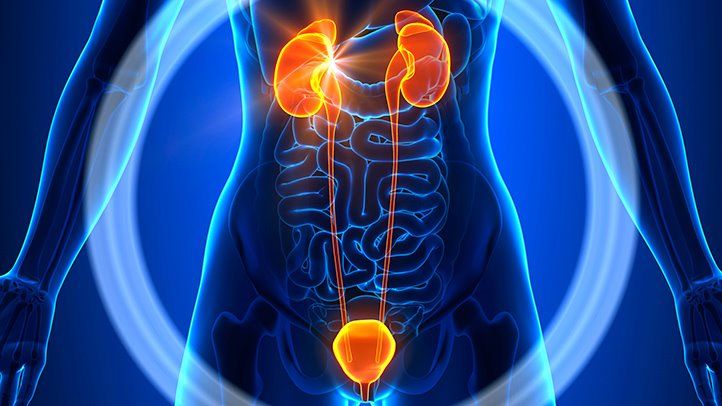WHAT IS BLADDER PAIN?
Although we don’t really hear a lot about bladder pain, it is a condition that many people face and deeply suffer from. In order to determine what bladder pain is, let’s locate the bladder and explain how it works.
The bladder is the organ that stores urine in the human body, and it is located in the lower abdomen. It is basically a muscle; it is completely relaxed when filled with urine. When it reaches its maximum capacity, the person feels the need to urinate.
Therefore, the bladder sends signals to the brain letting the person know that it is time to empty it. The muscles contract to squeeze the liquid outside of the body. It is important to note that, if the bladder is healthy and normal, it can wait a little bit before emptying itself, but if a sensation of pain and burn occurs, then there is a definite issue that requires attention.
This sensation of pain, along with the frequency of urination and its urgency, can be caused by an infection, inflammation, or any form of injury, which may lead to more serious issues.

WHAT ARE THE CAUSES OF BLADDER PAIN?
As the bladder is the organ responsible for urination, the cause of its pain is strictly related to urine. Therefore, bladder pain is caused by a number of urinary disorders. Some of them are:
- Tumors, whether they are benign or cancerous.
- Abnormalities in the congenital organs.
- Bowel disorders.
- Ovary disorders, such as endometriosis.
However, the causes that require attention the most are:
- Interstitial Cystitis: This condition may also be called “bladder pain syndrome”, and it is defined as a chronic bladder issue. It occurs when the bladder is extremely irritated and infected. The sensation of pain can be mild or severe, and it can increase with time if not treated. It can be caused by any trauma or injury that might hit the bladder and its organs, however it’s not that simple to detect the main reason behind it.
Studies show that this condition hits females more than males, as females feel it more during sexual intercourse. The most known symptom for this disorder is the immense pain felt when the bladder is filled with urine, and the immense relief when it is empty. It can also be detected through the frequency of urination, as mainly people suffering from interstitial cystitis tend to feel the need to urinate more than others.
Also, the urgency of the urination sensation is one of its symptoms, even after the person has emptied their bladder. This condition can get in the way of the person’s daily habits and activities and can even deprive the patient from sleep. Unfortunately, there are no tests that can be run in order to determine whether or not the person is suffering from this condition.
However, running general health tests and checking the patient’s medical history can give the doctor a pretty clear idea.
- Urinary Tract Infection: This infection is the type that hits the bladder or any of the related organs, such as the kidneys or the urethra (the tube where urine passes to leave the human body). It is also a condition that hits females more than males, and it is all related to the wiping technique that most women use.
As we all know, in the woman’s body, the anus is very close to the urethra. Therefore, after urinating, when women wipe from the back to the front, bacteria from the intestine might easily reach the urethra, which causes immediate infection. This is why it is always advisable to wipe from the front to the back.
The main symptom of this condition is a burning sensation while urinating. Like any other infection, urinary tract infection can be treated through antibiotics intake or any prescribed medicine.
Bladder cancer: The most serious condition that could be the cause of bladder pain is without a doubt bladder cancer. It begins in the cells, which are connected to the kidneys, and it spreads through the entire bladder, causing pain. It also causes blood in the urine and lower back pain.
This condition can be easily detected through imaging tests or urinalysis, and the treatment depends on the severity of the situation. Therefore, it is always advisable to get a doctor’s consultation if the pain persists for a long time.
HOW CAN A PERSON KNOW THAT SOMETHING IS WRONG?
Other than feeling a serious pain sensation, there are many signs, in the bladder or any of the related organs, which tell the person that something is wrong. Some of these signs and symptoms include:
- Urine with blood residue (pink colored)
- A difficulty in urinating
- A weird smell of the urine
- The high frequency of urination which produces a tiny amount of urine
In addition to those signs, the human body shows other signs that can easily mean that something is wrong with the bladder, such as:
- High fever and chills
- Vomiting constantly
- An intense pain in the lower abdomen
- Tiredness
- Ache in the lower back and groin
- Sweating while sleeping

WHAT ARE THE POSSIBLE COMPLICATIONS FOR BLADDER PAIN IF NOT TREATED?
Any form of pain should be detected and determined in the human body before it’s too late. In the case of bladder pain, many complications might arise, if it is not well treated. Once the cause of the pain is recognized, a treatment is given. Some of these complications might include:
- Widespread infection
- Organ failure
- Chronic pain
- Cancer spread
- Sepsis
HOW CAN A PERSON TREAT BLADDER PAIN?
There are many forms of treatments that can be done or taken, depending on each person’s case and medical history. What’s important to note regarding bladder pain treatment is that it takes time to start showing healing results. Mainly, any person suffering from this sort of pain should contact their healthcare provider and get their consultation. They will be the ones to provide the appropriate treatment based on your situation.
- Adjusting your daily habits: It might sound weird to some people, but there are a lot of daily habits that can be changed in order to relieve bladder pain or control it. A lot of patients are advised to follow a specific manipulative physical therapy that can ease the pain, while others are advised to follow a certain diet in which they cut down on specific food and beverages that might be the reason behind the pain, such as caffeinated beverages, tomatoes, and alcohol.
- Taking specific medications: Along with these lifestyle changes, the healthcare provider might prescribe certain types of medications to relieve bladder pain and relieve it. These medications can be either oral or intravesical, and some might be light, while others might be heavy. These medications might show some side effects such as drowsiness, temporary hair loss, and an upset stomach.
- Injections: If all the other simpler treatments don’t work, then injections are a must. This treatment should be repeated every 6 to 9 months, as its effects go away with time, but it offers a great solution to bladder pain.
- Neuromodulation therapy: It is a group of treatments defined by delivering electrical impulses which are harmless to the nerves of the bladder. This form of therapy is given if the pain persists after taking the right medications. In order to undergo this treatment, the healthcare provider must run a full test to check if the patient can take it.
- Surgery: When all treatments fail, surgery is the right way to go. Only the doctor can determine whether or not the person’s case applies for a surgery. The patient should be aware of all the risks and changes that are associated with undergoing a surgery.
WHAT HAPPENS AFTER TREATMENT?
Simply, treatments should be consistent. Many people go through specific forms of therapy, or take certain types of medications, then develop symptoms all over again because of their inconsistency. The patient should always follow up with their doctor in order to determine if the symptoms will gradually go away, or if there’s a possibility to completely heal from the condition.
As people’s bodies differ, there are a lot of patients who do not get the desired result after therapy. However, the pain can always be manageable in order to provide the right quality of life. Many pain management techniques and therapies that don’t include drug intake may be given, which can alleviate the aching sensation.
Just like any treatment, most patients will find a sort of improvement in their situations, but some symptoms might still be there, such as urinating more than usual and feeling discomfort in the bladder area. This is why all prevention techniques should be taken into consideration in order to maintain a balanced and healthy condition and stay away from pain as much as possible.
If you or anyone you know has severe pain near your lower abdomen area, please contact our specialists at Specialty Care Clinics.
Call (469) 545-9983 to book an telehealth appointment for an at home check-up.
